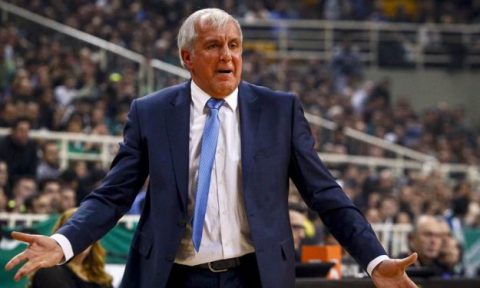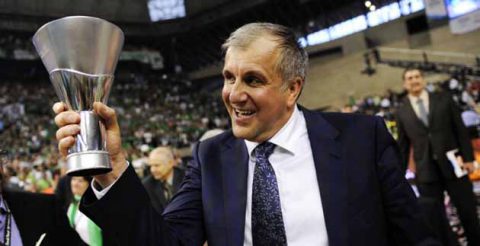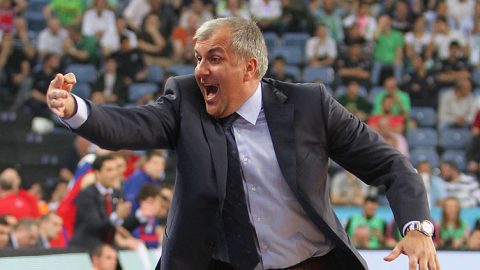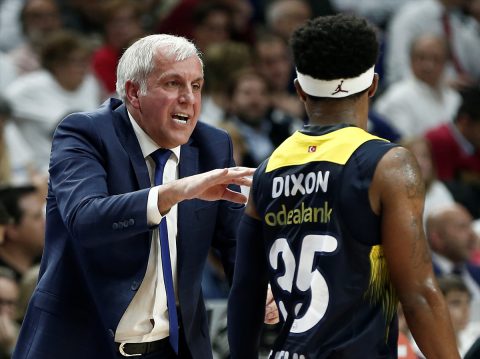Zeljko Obradovic awaits next coaching challenge
For Zeljko Obradovic, there isn’t a discernible distinction between winning and breathing. Both acts are intrinsically connected. What’s more, they define his coaching career.
He’s been called the greatest European coach. He’s been labeled the best basketball bench boss not working in the NBA.
Since the early 1990s, Zeljko Obradovic’s track record of success is astonishing, including nine EuroLeague titles with five different clubs, a record 18 trips to the EuroLeague Final Four and 14 EuroLeague final appearances.
The 61-year-old Serbian, who’s been on a coaching sabbatical since leaving Turkish club Fenerbache last spring, has nothing left to prove. He will always be known as one of the greatest basketball coaches of all time.
Clearly, his legacy is safe.
However, a few questions remain: Which team will hire Obradovic next? How long does he wanted to keep coaching? And will he ever be hired to lead an NBA team?
An NBA future for Zeljko Obradovic?
When Obradovic announced his departure from Fenerbahce after seven seasons, he said he would take a year off before returning to coaching.
The clock is ticking, but the Serbian should resurface somewhere within the next few weeks or months.
The odds of Obradovic leaving Europe to coach in the NBA decrease with each passing year. But he spelled out his ambitions to coach in the NBA many years ago.
Popovich praises Obradovic
But there’s no question his coaching acumen and keen understanding of the modern NBA game are complementary skills.
Just ask Gregg Popovich.
The longtime San Antonio Spurs coach gave Zeljko Obradovic perhaps the best compliment he ever received. Popovich admitted years ago he’s “stealing plays” from the Serbian tactician.
In other words, Popovich, who has led the Spurs to five NBA titles, recognizes the value of replicating Obradovic’s methods on the basketball court achieve.
“Coach Obradovic may be the best coach in Europe at this stage and one of the best in the world,” Popovich said in October 2007. “He could easily be over here coaching an NBA team, in my opinion. I can’t wait to watch the films and see some of the things they run because he does a lot of good things.”
A great basketball mind
Former Fenerbahce player Derrick Williams noted earlier this year that Obradovic’s basketball IQ is off the charts.
“He’s an excellent coach,” Williams said. “He knows everything about basketball, he’s probably the smartest person I’ve ever met.
“There are only two people who for me are at that level of knowing everything about the game, LeBron James and Zeljko Obradovic. They know everything about the other team, they know everything about all the players on our team. Having a coach like that makes you want to work a lot harder, so I give him a lot of credit.”
It’s been suggested that top hoop strategists survey the court and concoct plans like a chessmaster in real time.
Obradovic delivered a different explanation a few years ago.
“Yes, there’s some parallel to chess, but also a difference,” he remarked in 2011. “In chess you play and you decide, while in basketball it’s the players who have to materialize your ideas on court. They are more important.”
Instant success as a coach
A former point guard, Obradovic developed great court vision on the courts of his native Cacak, in central Serbia (then a part of Yugoslavia). He also learned to channel his competitive drive on defense at a young age.
In the decades that followed, Obradovic’s teams have always played lockdown defense. At the same time, he has thrived since the start of his coaching career.
In his debut season on the bench, he led Belgrade-based KK Partizan to a 20-2 Yugoslav League record in 1991-92. Partizan captured the league title with a three-game sweep of Crvena Zvezda in the best-of-five finals. Partizan also won the Yugoslav Basketball Cup and edged Joventut 71-70 in the FIBA European League (now called the EuroLeague) final.
Early on, the pillars of Zeljko Obradovic’s coaching philosophy were on display.
Or as he once remarked: “If you play good attack (on offense), you win the game, but, if you play good defense you win championships.”
An established winner
By 2007, Zeljko Obradovic was a well-established coaching titan and in the midst of a glorious run with Greek League powerhouse Panathinaikos. He joined Panathinaikos in 1999 and led the Athens club to 11 Greek League titles, seven Greek Cup crowns, and five EuroLeague-winning campaigns (2000, 2002, 2007, 2009, and 2011) before taking over at Fenerbahce the next year.
In May 2018, fellow Serb Igor Kokoskov became the NBA’s first European head coach with the Phoenix Suns. In the same month, future NBA star Luka Doncic and Real Madrid edged Fenerbache in the EuroLeague final. (A year earlier, Obradovic piloted the Turkish squad to an 80-64 win over Olympiacos, giving the Serbian taskmaster his ninth EuroLeague title).
Kokoskov lasted one year in charge of the Suns, who had the league’s second-worst record (19-63). He then served an assistant with the Suns before moving overseas.
In July 2020, Fenerbahce hired Kokoskov to fill its coaching vacancy.
Before building a dynasty in Athens
Nobody with a clear mind would call Zeljko Obradovic’s overall success at Partizan, Joventut, Real Madrid and Bennetton Treviso a fluke.
After all, he led three teams — Partizan, Joventut and Real Madrid — in three nations to EuroLeague tiles in his first five seasons as a sideline supervisor. It was unprecedented. The trifecta was completed with Obradovic’s Joventut beating Olympiakos in 1994 and his Real Madrid squad conquering the same Greek team the next year.
Powerhouse Panathinaikos
For Obradovic, one of his transformational coaching decisions at Panathinaikos proved to be the perfect move. He moved former Memphis Grizzlies player Michael Batiste, an undersized power forward, to center when he joined the club in 2003.
The 6-foot-8 Batiste became a linchpin of the team’s aggressive defense and an integral part of Obradovic’s pick-and-roll offense.
For Batiste, it wasn’t a simple adjustment. He acknowledged as much years later. “It was a difficult transition, finding myself in a center position from a small power forward,” Batiste said.
But Obradovic’s vision for the team fused with Batiste’s perfect fit at the pivot. Nine consecutive Greek League titles and three EuroLeague crowns during Batiste’s Panathinaikos years provide ample evidence.
Panathinaikos, of course, was far from a one-man team. Batiste thrived alongside such stalwarts as Vassilis Spanoulis, Sarunas Jasikevicius, and Dimitris Diamantidis. Together, with Obradovic calling the shots, they created Europe’s most prolific winning squad.
Panathinaikos team owner and president Pavlos Giannakopoulos, who passed away in 2018, invested wisely in players that worked well under Obradovic, creating a winning environment. A true family.
Zeljko Obradovic’s national team stint
In addition to his distinguished career as a club coach, Obradovic demonstrated he could match coaching wits with anyone on the global stage during his time as the Yugoslavia men’s national team coach (1996-2000).
So what did the Obradovic-led team do in that time span?
Yugoslavia earned a silver medal at the 1996 Atlanta Olympics. After that, Yugoslavia won gold at the 1997 EuroBasket Tournament and gold at the 1998 FIBA World Championship .
Which brings to mind a question posed on this website a few years ago: Would a Yugoslavia national team beat the USA?
Illuminating thoughts on Zeljko Obradovic
As a longtime Europe-based basketball coach and talent evaluator, Tim Shea has closely followed Zeljko Obradovic’s coaching career for decades.
In a recent interview with Latest Basketball News, Shea spoke eloquently about Obradovic’s broad influence on his coaching peers.
“Even the Spanish coaches copy him,” Shea said by phone from Spain. “The Italian coaches copy him. Everybody copies him — that attitude, that dominance. He’s the colonel, the major and the sergeant.”
In the final analysis, Shea said Obradovic commands respect from his players.
How does he do it?
“What gets him respect with players, because he can be very vocal, if you weren’t a solid character if would look like he was humiliating you in public. But what he was doing was he was giving you everything he had, and the players respected that,” Shea pointed out. “And Zeljko expected the player to give everything he had. And if he didn’t, Zeljko would let him know.
Shea continued: “He’s a good psychological tactician on the bench during games. He’s been in duels with (Ettore) Messina and he runs rings around Messina. He always did, and I used to enjoy watching Messina try to follow his moves during the games. And that’s what he does. He imposes a flavor to a game, a style, whatever. He imposes his personality, imposes his discipline, and if you can’t match it and his bench, (trouble awaits you).”
Parting thoughts
First and foremost, Shea believes Obradovic will always thrive while coaching in Europe.
The reason? “There are no European players in any way, shape or form who would disrespect him,” Shea concluded, “because they know that he’s giving 25 hours a day to the next game and to that game.
“It’s a question of passion. It’s his passion. He demands from himself, so he demands from his players.”




